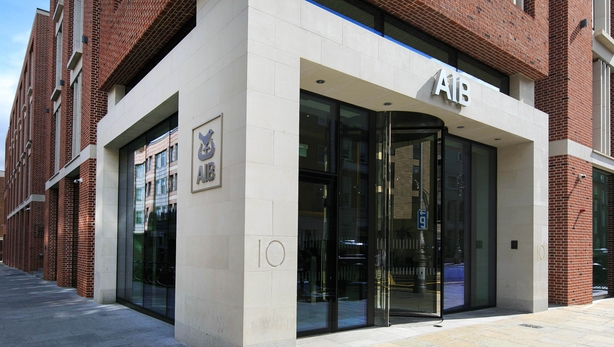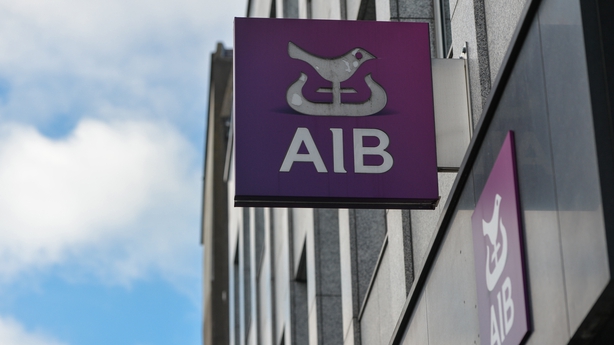AIB shares jumped in Dublin trade today after its chief executive said there is a "clear path" for the bank to return to full private ownership this year.
Earlier, the bank reported higher profits and income for 2024, which were ahead of expectations, as its customer base reached a new high of 3.35 million.
AIB said its profit after tax for the 12 months to the end of December rose to €2.35 billion from €2.06 billion in 2023, while its operating profits increased by 3% to €2.8 billion.
The bank said its total income was up 4% to €4.908 billion, while its net interest income rose by 7% to €4.129 billion from €3.841 billion on the back of its growing balance sheet and the favourable impact of higher average interest rates.
It said it will return a total of €2.6 billion to shareholders through a mix of dividends and share buybacks compared to €1.7 billion in 2023 - a payout ratio of 109%.
AIB's gross loans increased by 6% to €71.2 billion from €67 billion, mainly due to strong new lending and the completion of the onboarding of €0.8 billion of Ulster Bank tracker mortgages.
AIB's total new lending increased by 17% to €14.5 billion from €12.3 billion as it noted positive trends across mortgages, renewable energy and corporate lending.
It said its new mortgage lending in Ireland was up 14% to €4.5 billion, which reflected a mortgage market share of 36%.
AIB said its return on tangible equity (ROTE) increased to 26.7% from 25.7% in 2023.
AIB chief executive Colin Hunt said the bank has the necessary capital to lend to builders and developers.
We need your consent to load this rte-player contentWe use rte-player to manage extra content that can set cookies on your device and collect data about your activity. Please review their details and accept them to load the content.Manage Preferences
Speaking on Morning Ireland, Mr Hunt said, "We have the ambition and the desire to be a very active player in the building of more homes in this country over the years ahead. That's really good for the bank, it's good business for us to be writing, but of course it's also very good for Irish society and the Irish economy."
He said, however, that while there is no impediment to the bank lending to the industry, there is a shortage of residential construction projects.
"Our role is to be a provider of debt to the building of new homes," the CEO said. "Last year we financed the building of a third of all the houses that were built in the country, so certainly there is no impediment to us, other than a shortage of projects at the moment."
AIB also reported €5.1 billion in new green lending last year, which represented 35% of its overall lending.
Meanwhile, new lending to Irish SMEs remained relatively stable at €1.6 billion with the bank noting that more than 60% of small business loans originated on its new online business loan platform.
Overall credit quality remained robust at the lender during the year, it added.

AIB's chief executive Colin Hunt said the bank has again delivered a very strong performance in 2024 with profit after tax of €2.35 billion, a 26.7% return on tangible equity and total distributions to shareholders of €2.6 billion.
"Against a solid economic backdrop, new lending grew by 17% to €14.5 billion with 6% loan book growth to €71.2 billion," the CEO noted.
"We have continued to expand the Group's products and services as well as our customer base, which at 3.35 million has never been higher," he added.
The AIB CEO also said there is a "clear path" for the bank to return to full private ownership this year.
The State invested about €64 billion in Irish banks during the financial crisis to prevent the banking system from collapsing, with just under €21 billion of that going to AIB as a bailout.
Mr Hunt said that AIB has so far returned €18.5 billion of that investment, and that discussions are under way with the Department of Finance for a further €1.2 billion share buyback.
The State's shareholding in the bank currently stands at 12.39%, down from 71% in 2022.
AIB will seek approval for the €1.2 billion buyback from its shareholders at its AGM on May 1, which Mr Hunt said meant a return to full private ownership for the bank is "achievable" in 2025.
Once the State no longer has an investment in the bank, it would open the door for the removal of the €500,000 cap on bankers' pay that was introduced by the Government following the bailout.
AIB and PTSB are still subject to the pay cap, however, Bank of Ireland - which returned to full private ownership in 2022 - is not.
Bank of Ireland's CEO Myles O'Grady received remuneration of €1.37m last year, compared to €644,000 for AIB's Colin Hunt, and €596,000 for PTSB CEO Eamonn Crowley.
In recent years, AIB has consistently lobbied the Government to remove the pay cap.
The bank argues that it "severely hampers" its ability to attract and retain senior executives and leaves it "at a material disadvantage" to competitors.
The 2025 Programme for Government commits the Government to "normalising the domestic banking system to best serve the interests of the economy", and once the State's shareholding in AIB is down to zero the lender is expected to increase the pay it offers to senior executives.

Meanwhile, Colin Hunt also said today that Ireland is well positioned to weather the storm from the introduction of any tariffs.
Speaking at the bank's financial results, Mr Hunt said that tariffs will have a dampening effect on the global economy and given Ireland is an open economy, it will not be immune.
He highlighted Ireland's pharmaceutical and tech sectors as being especially exposed to the introduction of any tariffs.
He expects domestic demand in Ireland to "moderate" but said that the underlying fundamentals of the Irish economy remain robust and the country is well positioned to weather the storm that lies ahead.
The AIB CEO also pointed out that although America is important to Ireland in terms of investment, it is not a one-way relationship.
Mr Hunt said that Irish companies employ more people in the US than US companies employ here.
The bank, one of Ireland's two dominant lenders alongside Bank of Ireland, said today that it had made a good start to 2025 and expects loan growth of around 5% with NII of more than €3.6 billion, down due to an expected drop in interest rates.
Analysts at Davy Stockbrokers said that implies a 2% beat to analysts' 2025 consensus forecasts for underlying profit before tax.
AIB's finance chief Donal Galvin said while Ireland's strongly growing economy would eventually be affected if growing external risks lead to a slowdown in Europe, he did not expect that to hamper momentum in the Irish mortgage market.
He said AIB's exposures to foreign direct investment-type companies is not large.
"Our starting point is still in a much better place than most of the other European countries, not just with respect to growth but also the government's fiscal position," he said.
Shares in the bank moved higher in Dublin trade today.

